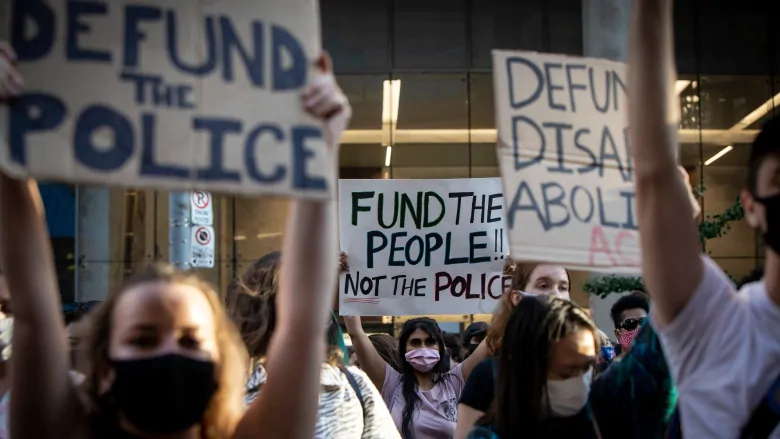Community groups and members of the public express their disagreement

On January 3, Toronto mayor John Tory proposed a $48.3 million budget increase for the Toronto Police Service. This would bring the service’s 2023 budget to about $1.166 billion and see over 200 new police officers join the force.
Tory’s announcement comes on the heels of a number of high-profile crimes that have occurred around Toronto this winter, including violent incidents on the TTC. In an address to the public, he framed the budget increase as a response to these incidents, stating, “We must do everything we can to address crime and to keep people safe and have them feel safe in our city.”
Tory recognizes correctly that Torontonians desire a safer city. However, many have responded to his announcement with concerns about the short-sightedness of this enforcement-based solution to crime. Instead, other city councillors, community organizations, and members of the public are calling for redirection of police funding towards social services to better address the roots of crime.
On January 9, a group of seven newly-elected city counsellors, Amber Morley, Chris Moise, Lily Cheng, Alejandra Bravo, Ausma Malik, Jamaal Myers, and Dianne Saxe, released a statement in response to the City’s budget, writing that, “Governments have prioritized enforcement over addressing the root causes of crime and violence: poverty, discrimination, lack of opportunities, underinvestment, and inequality. Decades of research and evidence has shown that increasing police spending without simultaneous investments in social and community infrastructure does not make our communities safer.” The statement calls for investment in community-led crisis response programs like the Toronto Community Crisis Service (TCCS) created in 2022 which aims to respond to individuals in crisis without police intervention.
The proposed policing budget increase includes an additional $2 million for youth and families allocated to anti-violence programming. Additionally, the overall 2023 budget includes an additional $17 million for crisis supports, including the TCCS. Nonetheless, these numbers pale in comparison to the overall budget of the Toronto Police Service, demonstrating that policing remains the City’s knee-jerk response to crime at the expense of other crucial services.
The little social support the City does offer is insufficient to offset the harm that years of austerity measures continue to cause. A recent report by City of Toronto staff acknowledges there is high demand for shelter space as Toronto becomes a more expensive and unlivable city, with the City’s shelter system at capacity most nights. Despite this, in 2022 the City closed three temporary shelter sites, and in 2023, it is likely to close an additional five. Community groups such as the Shelter Housing and Justice Network and Health Providers Against Poverty have called for the City to open more spaces in its warming centres this winter, a call that was also made to the Toronto Board of Health. City Councillor Alejandra Bravo points out that the cost of policing homelessness in the city amounts to about $100 million per year. She questions the City’s choice to prioritize policing over the provision of supportive housing, which, for $108 million, could reach a total of 45,000 people and effectively end chronic homelessness in Toronto.
Krisna Saravanamuttu, a community organizer, writer, and criminal defence lawyer at Rudnicki and Company, writes similarly that we can choose “life-affirming policy decisions that boost food and housing security, public health care, and decent work protections,” but we nonetheless “remain tethered to policing, despite its futility.” Saravanamuttu points out that, more than just siphoning money from crucial social services, policing actively harms low-income, racialized communities through heightened surveillance, harassment, and police brutality.
His comments challenge Tory’s assertion that policing keeps people safe, begging the question: who exactly feels safer from increased police presence? Saravanamuttu grew up around gun violence, in a community housing project consisting mostly of Black and Brown people. He writes as someone whose community was deeply affected by Toronto’s “Summer of the Gun” in 2005, which saw 52 homicides in one of the City’s deadliest seasons ever. He concludes that, “Study after study has left one conclusion unequivocal…violence is a public health concern born from the suffering created by income inequality and racism.”
On January 17 and 18, the City’s Budget Committee held public consultations. In preparation, organizations such as Progress Toronto held free trainings to inform members of the public about the consequences of the budget and to teach them how to prepare deputations for the consultations. However, many members of the public left these consultations feeling rather disheartened. Despite hearing many concerns, Councillor Gary Crawford, Chair of the Budget Committee, appears unwilling to budge. “I recognize the concerns that people have,” he stated following a January 17 meeting in Toronto, “but I do stand by the support we have given the Toronto Police in this budget of the 4.3 percent increase, and I respect the opinions of people, but I still stand by the increases.”
On February 14, the budget will be voted on.





